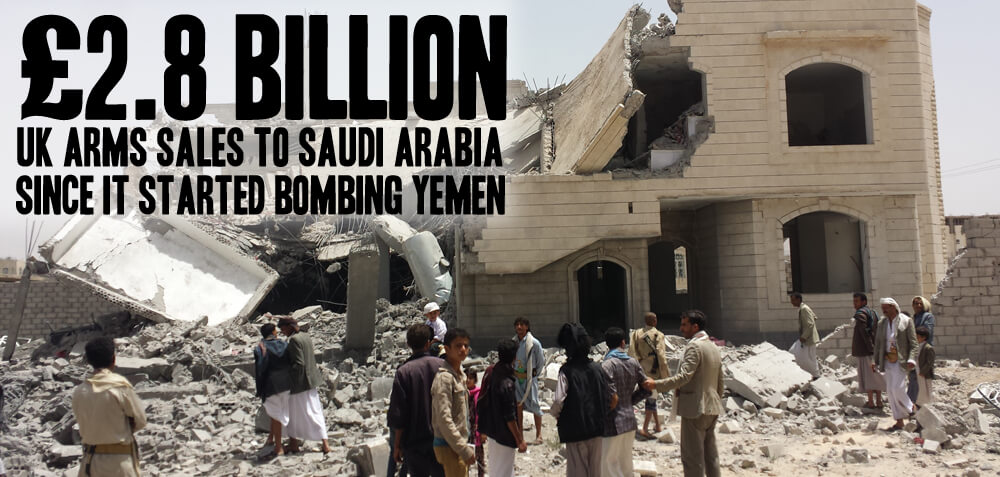World’s Largest Oil Fields and U.S. Involvement in International Hostility: A Coincidence?
 According to the American Energy Society, below is a list of the five “most important” oil fields in the world.
According to the American Energy Society, below is a list of the five “most important” oil fields in the world.Notice anything about them? Hint: look at geographic location.
- Ghawar (Saudi Arabia) – 88 billion barrels of oil remaining in reserve
- Burgan (Kuwait) – 69 billion barrels in reserve
- Safaniya (Saudi Arabia) – 52 billion barrels in reserve
- Rumaila (Iraq) – 18 billion barrels of recoverable oil
- West Qurna-2 (Iraq) – 14 billion barrels of recoverable oil
OK, now that you’ve had that realization, ask yourself a couple of quick questions:
Why does the U.S. ally itself with the world’s largest state sponsor of terrorism (Saudi Arabia)?
Why, to this day, is the U.S., does the U.S. supply arms and day-to-day military support to Saudi Arabia in its ongoing war crime against Yemeni civilians?
Why did the U.S. invade Iraq in 2003, beginning the longest war in our country’s history?
Now for the coup de grace:
Do I have a moral obligation to raise my voice against this systematic butchery, that exists simply because these people have a lot of oil?
Note: once transportation is electrified, these suppressive regimes will have the same relevance in the world as Paraguay and Botswana.

Alan Greenspan, 2007: “I am saddened that it is politically inconvenient to acknowledge what everyone knows: the Iraq war is largely about oil.”
U.S. Secretary of Defense – and former 12-year Republican Senator – Chuck Hagel, 2007: “People say we’re not fighting for oil. Of course we are. They talk about America’s national interest. What the hell do you think they’re talking about? We’re not there for figs.”
Four Star General John Abizaid – the former commander of CENTCOM with responsibility for Iraq: “Of course it’s about oil, it’s very much about oil, and we can’t really deny that.”
Undersecretary of State – John Bolton, 2013: “The critical oil and natural gas producing region that we fought so many wars to try and protect our economy from the adverse impact of losing that supply or having it available only at very high prices.”
“All wars are fought for money.” – Socrates
Craig,
If you phrase all your questions to achieve the answer you want, what’s the point in asking ?
In fact your basic premise in either outdated, or completely inaccurate !
1) Saudi Arabia does not support terrorism ! Some Saudi citizens, even organizations like some Americans, may be involved or support terrorist activities, but those individuals and organization are neither supported not endorsed by the State of Saudi Arabia.
2) the US is now energy self sufficient and it’s largest imports are from Canada and to a lesser extent, Mexico.
3) US exports to the Arab nations and re-export of imports from those countries is a very important consideration in US balance of trade.
4) The Oil industry (especially light crude) produces over 350,000 products. Nearly all these products have a higher profit margin than gasoline and diesel.
5) The US maintains a strong strategic relationship to ensure the Arabian Peninsula doesn’t fall under the influence of Russia or the PRC creating even more problems, especially for Israel.
6) The problems of the region are historic and not of US creation. (although uncritical support for Israel has created problems). The problems were largely created in 1920 when the European power broke up the old Ottoman Empire and created countries without any consideration or knowledge of local loyalties, feuds, religious and tribal sensitivities.
7) The war in Yemen is like all civil wars, cruel and brutal. These causes of the war and the enlisting of allies to help conduct the war have further complicated the tragedy and ensured a sort of stalemate with no real solution.
The idea that civilians should not be involved is a fiction. All wars involve civilians, in fact the lines have become so blurred in civil wars it;s impossible to determine who isn’t a combatant.
The European idea of ‘rules in war’ and soldiers behaving as sort of quasi police is an impossible fiction. The allies would never have won the Second World War without intensive bombing of civilians. Siege warfare is as old as organized warfare. The idea is to not only break armed resistance but make the population wary of endorsing subsequent opposition.
Civil war is always a tragedy, the best result is seldom a series of uneasy truces with endless fighting, and the population treated as refugees, but outright victory for one side or the other, or a national division with a natural border.
It sounds harsh, but the only way for progress is if the civilian population is so traumatized by warfare they can put aside old hatreds and adopt new purpose.
Regrettably, most modern conflicts are incomprehensible to those not involved. The only real difference between a Palestinian fighter triggering a bomb in an Israeli market killing scores of Israelis or an Israeli pilot dropping a bomb on a Palestinian market killing scores, is one has access to an aircraft !
To the victims, there’s no difference.
Only a few years ago the US was involved in the bitter and brutal Balkans civil war. Where’s the oil in Kosovo ?
Access to oil revenue just means the crazies on either side can afford more and better weaponry, but the causes are always more ancient and absurd than just oil.